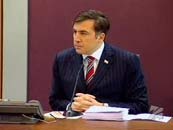|
Thursday,
October 18,
2007, #199 (1466)
 President pushes electoral reform President pushes electoral reform
Changes would lower the bar for parliamentary representation, dilute presidential control of parliament
By Nino Mumladze

President Mikheil Saakashvili,
addressing majority MPs at the
state chancellery |
As a contribution to “enhance the political culture” in Georgia, President Mikheil Saakashvili pitched a package of constitutional reforms which would decrease the electoral vote threshold, limit the president’s control on parliament and prolong the parliament’s term of office to coincide with presidential elections.
“I propose reducing the existing seven percent threshold [for parliamentary representation] to five percent…and [I offer] to restrict the president’s right to dissolve parliament and to extend parliament’s term [from four] to five years. This will give simultaneous parliamentary and presidential elections, once every five years,” Saakashvili told majority MPs in an address at the state chancellery.
Currently, the constitution empowers the president to dissolve parliament if it fails three times to approve the state budget or pass a vote of confidence on the cabinet of ministers.
Constitutional amendments incorporating the president’s initiatives will be presented next week, ruling party representatives said after the president’s address.
Speaking at the chancellery, Saakashvili talked of a wish to engage in “constructive dialogue” with the political opposition.
But at the same time, he said the proposed electoral reforms were motivated by a desire to help new political forces come to the fore, to replace the current crop of “weak” and “destructive” opposition parties.
“I think you all witnessed [the weakness of opposition] during recent days,” the president said.
“I hope new political groups will form in Georgia, overcoming the five percent electoral threshold to be our honorable partners in altering political culture in the right direction,” Saakashvili declared.
The Parliamentary Assembly of the Council of Europe (PACE) has more than once recommended that Georgian authorities reduce the current seven percent electoral threshold to at least as low as five percent.
Parliamentary majority leader Maia Nadiradze, however, ruled out international pressure as the reason for lowering the electoral threshold. The decision came after consultations amongst the majority party, she said after the president’s address.
Opposition leaders, meanwhile, say the belated lowering of the threshold—three or four years after the opposition and international organizations first called for the move—signals the anxiety the president feels about the upcoming November 2 opposition rally.
“The president is once again offering to manipulate the constitution,” Republican Tina Khidasheli, a leading representative of the opposition coalition known as the United National Council, told Imedi TV after the president’s speech.
Georgia’s constitution has been amended six times, she said, but only now do the authorities want to lower the electoral threshold.
“Lowering the threshold to five percent is meant to rescue the [ruling party], as right now [they] face a problem in meeting the seven percent barrier,” she claimed, adding that her party is still open to dialogue.
Zurab Tkemaladze of the parliamentary Industrialists faction, which is not in the opposition coalition, announced his willingness to talk with the government—but said the authorities should come ready to compromise on some provisions of the election code.
In his address, Saakashvili again stressed the need for dialogue on key issues like territorial integrity and NATO accession.
“In this task, even the smallest [political] group is very valuable. That’s why we stretch out our hand to everyone, including those who are not very good at speaking,” he said.
The president pointed out that his party would be willing to share their power with anyone, except for “oligarchs.” That is a clear reference to business tycoon Badri Patarkatsishvili, the co-owner of Imedi TV now at the center of the capital’s political standoff after being named as a collaborator by arrested ex-minister Irakli Okruashvili.
“We share political power with the Georgian people, but we are not going to share political power with some artificially-planted oligarchs. We won’t let it happen in Georgia,” the president warned.
On October 17, the United National Council sent a manifesto to the president and Speaker of Parliament Nino Burjanadze outlining their four key demands.
The opposition coalition is calling for parliamentary elections in April 2008, new election oversight boards which include political party representatives, overhauling the plurality voting system used to elect a portion of MPs in favor of proportional representation and the release of all “political prisoners.”


© The Messenger. All
rights reserved. Please read our disclaimer
before using any of the published materials.
|